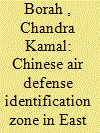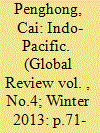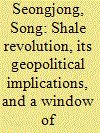| Srl | Item |
| 1 |
ID:
125384


|
|
|
|
|
| Publication |
2013.
|
| Summary/Abstract |
Since its outbreak in the beginning of 2011, the Arab transformation that swept almost the whole middle east has now entered the third year with its geopolitical implications beginning to unfold gradually. When erupted in Tunisia and Egypt, it was driven primarily by internal dynamics and was regarded as a genuine local, bottom up movement in general. Much to people's surprise, incumbent regimes such as the Mubarak regimes in Egypt and Ben Ali regime in Tunisia that were once considered to be durable and formidable were too quick to be overthrown.
|
|
|
|
|
|
|
|
|
|
|
|
|
|
|
|
| 2 |
ID:
139368


|
|
|
|
|
| Summary/Abstract |
The unilateral declaration of Air Defense Identification Zone (ADIZ) by the Chinese government and its enforcement from 23 November, 2013, 10 AM (Chinese time) has triggered a different kind of geopolitical scenario and geo-strategic consideration in Asia. The changing nature of geopolitics can be seen in terms of the reactions that the states have shown. This is perceived differently by other states, especially the rival forces as the symbolism of Chinese expansionism.
|
|
|
|
|
|
|
|
|
|
|
|
|
|
|
|
| 3 |
ID:
141916


|
|
|
|
|
| Summary/Abstract |
Pakistani planners are increasingly prone to recognize the many links between water, food, and energy security. The construction of new large dams is seen by many as a concrete measure to achieve resource security for Pakistani for a future marked by climactic variability and unpredictability. This article explores the geopolitical and political geographic implications of Pakistan’s strategic vision of building dams as a way to prepare for climate change. The author argues that far from being politically neutral tools for development with predictable effects, large dams create new political and spatial arenas of conflict and contradiction at the international, regional, and local scales.
|
|
|
|
|
|
|
|
|
|
|
|
|
|
|
|
| 4 |
ID:
167307


|
|
|
|
|
| Summary/Abstract |
The ongoing devolution of power to the local level in Ukraine deprives Russia’s hybrid warriors of critical entry points and furthers Ukraine’s Europeanisation.
|
|
|
|
|
|
|
|
|
|
|
|
|
|
|
|
| 5 |
ID:
126380


|
|
|
| 6 |
ID:
138703


|
|
|
|
|
| Summary/Abstract |
The 2008 war between Georgia and Russia was predictably short, as Russian military might quickly trumped Georgian nationalist enthusiasm. Beyond its momentous geopolitical implications, it was the first war in which cyber activities loomed large; the conflict marked the public birth of “cyber war,” or at least cyber in war.
|
|
|
|
|
|
|
|
|
|
|
|
|
|
|
|
| 7 |
ID:
137220


|
|
|
|
|
| Summary/Abstract |
The shale oil and gas production boom has played a significant role in bringing about the recent precipitous fall in oil and gas prices, and in catapulting the United States into first place for oil production last year, ahead of Saudi Arabia. A number of factors at the core of the boom in the United States have contributed to its success: the combination of technological breakthroughs (e.g., horizontal drilling and hydraulic fracturing); talented entrepreneurship; a business-friendly financial
market; technological R/D initiatives supported by the government; favorable geological conditions; and the property-rights regime. The EU and Asia also stand to gain from the shale windfall; Russia, Saudi Arabia, Iran, and other OPEC members, on the other hand, are facing seriously negative impacts. Northeast Asia—particularly the Republic of Korea (ROK), China, and Japan—may have an
opportunity to benefit from the “Shale Revolution,” with the potential emergence of natural gas trading hubs in the region. This paper seeks to (1) identify the current status of the Shale Revolution, including the factors responsible for its success and the role of entrepreneurship in the shale breakthrough; (2) examine the geopolitical implications of the shale boom on important global players; and (3) explore the window of opportunity that is now open to nations in the Northeast
Asia region related to the Shale Revolution.
|
|
|
|
|
|
|
|
|
|
|
|
|
|
|
|